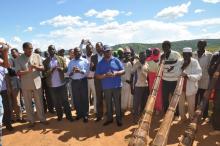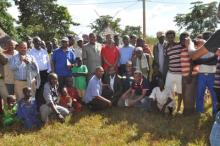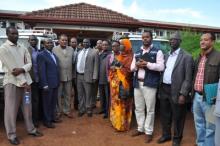From Control to Elimination of Onchocerciasis in Ethiopia
WHO, APOC and Ethiopia strengthen efforts to eliminate Onchocerciasis
A high-level joint mission led by Dr Kebede Worku, Ethiopian State Minister of Health with Dr Pierre-M’pele-Kilebou, WHO Representative to Ethiopia, Dr Jean-Baptiste Roungou, Director of the Africa Program for Onchocerciasis Control (APOC) and team leaders and technical officers from the three entities visited the Onchocerciasis Program in Assosa, Benishangul-Gumuz Regional State.
The mission aimed to acknowledge the progress made in Ethiopia in disease control efforts, and “the tremendous achievement in therapeutic coverage and an encouraging geographic coverage [of the distribution of Ivermectin],” as remarked by Dr Roungou. The mission also aimed to work with the regional government and meet with high-level regional leadership led by the Vice-President of the Region, Ambassador Misganaw Admasu, in the presence of cabinet members, the Head of the Regional Health Bureau, Ato Habtamu Taye and the region’s Onchocerciasis program.
During the mission, APOC donated two Toyota Land-cruisers to facilitate the mobility of the regional Onchocerciasis control program.
In thanking the high-level mission for their contribution to the control of neglected tropical diseases in the region, Vice-President of the Region, Ambassador Misganaw Admasu confirmed that the regional government, the Cabinet members and the health bureau will each contribute to cascade the support down to the lowest level to ensure that affected communities are freed from this scourge.
Onchocerciasis, also known as River Blindness, is a disease that causes blindness and disfiguring skin damage. The disease is caused by a worm (filaria) known scientifically as Onchocerca volvulus . It is the world's second leading infectious cause of blindness. In Onchocerciasis control and elimination efforts, the drug Ivermectin is administered once-to-twice yearly in communities through community-driven drug distribution (CDTI).
Following a recent policy shift from Onchocerciasis control to elimination, the Federal Ministry of Health has established the Ethiopian Elimination of Onchocerciasis Expert Advisory Committee (EEOEAC). Both WHO Ethiopia and APOC contributed to the technical documents formulating the EEOEAC.
For more information, please contact: Dr Abate Mulugeta Beshah, Neglected Tropical Diseases Programme Coordinator, WHO Ethiopia, Email: beshahb [at] who.int (beshahb[at]who[dot]int)
Photos: WHO Ethiopia/ Loza Mesfin Tesfaye







